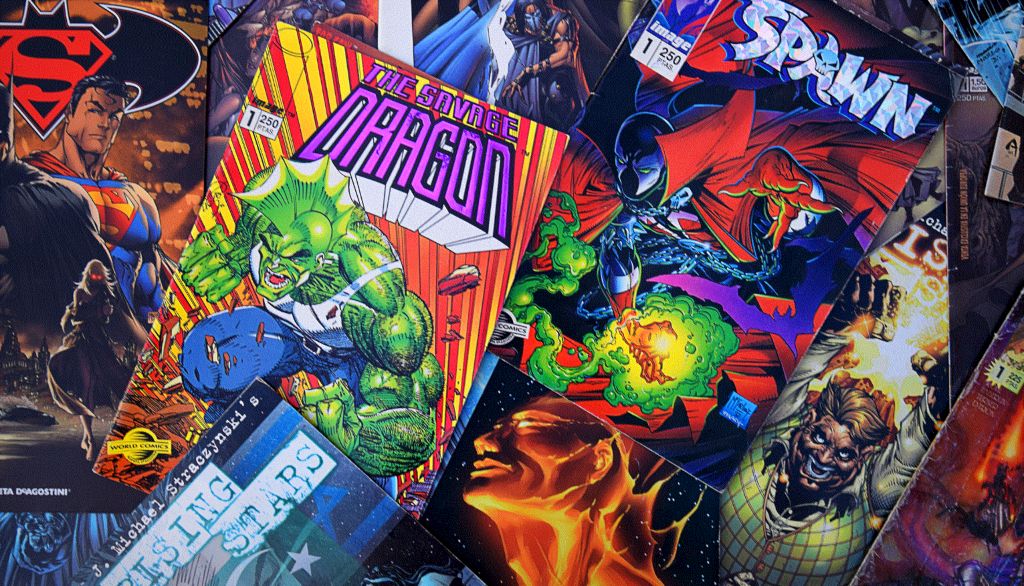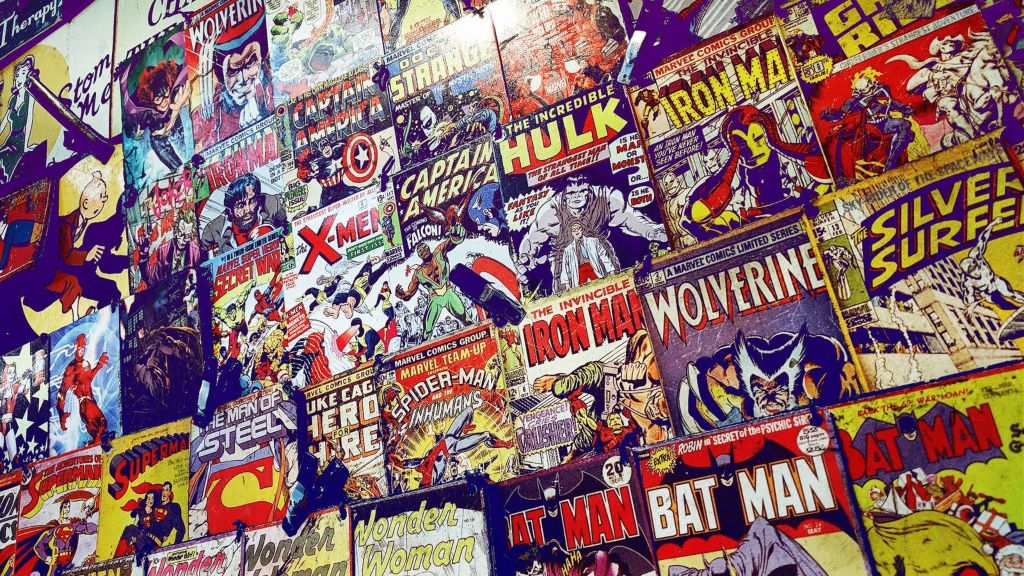
If you’ve followed this site for long enough, you’ll know I was a rather strange child. One of the few “normal” things I did was collect comic books, something I still do over twenty years later.
This got me thinking, should you still/start collecting comic comic books in this 21st Century world or not?
In many ways, comic books are a bit like art. The market for them is very similar, with people willing to pay millions for some ink and paper (paint and canvas!)
Reasons to Collect Comic Books
There are a number of reasons why you should begin to collect comic books. These include:
Potential For Huge Profit
If you have done any research into collecting comic books whatsoever, you’ll probably have come across articles entitled something like “10 Most Expensive Comics Books Ever!”
Reading those articles, you’d find that the first appearances of superheroes like Superman, Batman, Iron Man, Captain America and Spiderman, often sell for hundreds of thousands of dollars. Sometimes even millions of dollars!
If you buy comics printed today, and keep them in pristine condition, you may find that people will be willing to pay similar amount for them at some future date.
Perhaps one day, a minor character in one of your comic book issues is evolved into the most powerful supervillain in the entire comic book universe. As a first appearance, the value of it will most likely skyrocket.
Most often, the better condition the comic book is, the higher price people are willing to pay for it. And thus, make you potentially hundreds of thousands of dollars, not bad for a few dollars and keep it for a few years!
Chances are that you’ve heard the stories of people becoming millionaires overnight from comics. People have cleaned out their attic and found a rare comic, which they’ve later sold for millions.
Large Increases in Price Recently
In recent years, over the last 20 years or so, the prices for old comic books in particular, have increased in value dramatically. this is mostly thanks to comic books becoming a large part of pop culture.
Previously, comics were viewed as a rather fringe movement, mostly a bunch of “geeks” or “nerds” doing “weird” stuff. However, this has changed, with comics becoming more and more accepted by the masses.
Indeed, a number of comic book arcs have been turned into multibillion dollar box office hits. Many more have been used to make made-for-TV movies, many of which have been highly successful.
With the success of the comic on the silver screen, the value of the comic itself has skyrocketed. This is because collectors want to own the best comics, and what better than a comic that became a militbillion dollar movie?!
And this doesn’t look like it’s going to go away anytime soon. As of the time of writing, both Marvel and DC have movies queued up for the next few years, many of which are based of story arcs from the comics.
Naturally, many of these comics have already increased in value, since Marvel/DC have announced the movie. But, if the comic-based movie does well, these comics will more than likely increase in value even more!
It’s Easy to Get Into
I must admit, today, it is a lot easier to get into comic book collecting than it was, even ten years ago. Today, we are exposed to comic books on a daily basis, even if we don’t actually realize it.
As I mentioned before, some of the biggest blockbuster films of the past 10 years have been comic book-related. But there’s more than just that…
On top of movies, there are a number of comic book-related TV shows that you could watch. Whilst many of these are animated TV shows, aimed at young children, there are also a number of live-action shows aimed at adults.

Perhaps the most famous of these is DC’s Arrowverse, which (as of the time of writing) has ten shows currently on air. Marvel similarly has a number of its own shows too, the most famous of which is probably Agents of S.H.I.E.L.D.
On top of this, both companies are currently working on adding more shows to their respective universes.
But it’s not just comic book-related TV shows that have comics in them. Due to the fact that many people collect comic books, many of which have value, a number of crime-related TV shows see criminals steal multimillion dollar comic books!
Many Types of Comic Books
For much of this article, I will focus on superhero comic book, mostly because this is what I am most familiar with. However, comic books have been around since the 1930’s, and in multiple different genres.
If comics about beings with extraordinary abilities aren’t really your style, perhaps horror, or romance, or adventure comics are. Whilst these may not be as famous (or as valuable!) they are just as good, if not better (at times).
On top of this, there are also three main types of comic book: American; Franco-Belgian (BD) and Japanese (manga). These are all different in their own unique ways.
Despite the latter two being foreign in origin, you can actually get English-language versions of BDs and mangas if you wanted, meaning you don’t need to use Google Translate to be able to read your comic books!
In recent years, most comic book publishers have also began to create e-comics. This allows you to collect comic books without actually having any physical comic books to hand!
It’s Lots of Fun
If you’ve never collected anything before in your life, you won’t really know what I’m talking about. If you have (even if it’s something like trading cards, coins or wine), you’ll probably know what I’m on about.
From my own personal experience, collecting comic books is even more fun than collecting things like coins or trading cards!
By collecting coins, you get to learn about history. By collecting trading cards, you get to learn about the cards you collect. If they’re sports cards, you get to learn about that particular sport, whilst if it’s a game, you can learn its lore.
With comic books, however, you learn from them, which is the real beauty of them. By collecting comic books, you are able to form a larger story from them, one that could potentially take years to be fully written.
Once the arc has ended, you can reread the entire arc and revel in the simplicity of it all. Comics are like a puzzle, with each piece fitting into place almost perfectly!
Plus, take it from me, there’s nothing better than opening a box of comics you’ve been collecting for years, and just sitting and reading one. It’s a moment that’s truly priceless.
Reasons Not to Collect Comic Books
Despite the aforementioned reasons, there are also a myriad of reasons why you shouldn’t collect comic books either. These include:
There’s Lots (And Lots) of Jargon
As with any type of collectibles, there’s a lot of industry-related jargon that’s used by both collectors and dealers. If you’ve ever heard this, without any prior education on the matter, it probably sounds like a completely different language!
Here’s what you’ll probably hear the following to do with the physical comic book itself:
- First appearance (the first appearance of a given character)
- Second appearance (the second appearance of a character)
- Third appearance (the third appearance of a character)
- Four, fifth, sixth… appearance (you get the idea)
- Reprint (a modern-day, licensed reproduction of a famous comic book)
- Trade paperback (A less-valuable combination of a number of comic book issues)
As if this wasn’t confusing enough, you’ll often hear a lot of bloggers tell newbies to buy graded comics. These are essentially third-party companies who have a team of experts who can grade your comic, for a price of course…
Today, there are three major comic book grading companies:
- CGC (Certified Guarantee Company) – The largest and most well-respected of the three companies
- CBCS (Comic Book Certification Service) – The second-largest, and still fairly respected of the three companies (although their graded comics are worth 10% less than their CGC counterparts!)
- PGX (Professional Grading Experts) – The smallest and least respected of the three companies, many dealers won’t accept PGX-graded comics, although, many will (for as much as 30% less than the CGC equivalent!)
Naturally, these companies give certain grades to their comics, which are:
- Mint (MT) – A comic in perfect condition
- Near Mint (NM) – A comic in almost perfect, with only minor signs of use
- Very Fine (VF) – A comic with only a few minor signs of use
- Fine (FN) – A comic with a few minor defects
- Very Good (VG) – A comic with multiple, moderate defects
- Good (GD) – A comic with extensive, moderate defects
- Fair (FR) – A comic with multiple major defects
- Poor (PR) – A comic with a large number of major defects, that’s often missing pieces too
It’s Highly Subjective
Whilst I have condensed the official criteria into only a sentence, you can probably see how vague it is. What one grader may see as “minor” defects, another may see as “major”, and thus, both grade differently.
In order to prevent this, all three of the major grading companies grade comics through peer assessment.
Here, the first grader will grade the comic accordingly. A few days later, a second grader will do the same. A few days after that, a third one will do the same. This will continue for about a month.
Once all of the selected graders have graded that particular comic, the grades are compiled, with an average being drawn from it. This average is then double checked by an independent grader, before being awarded.
Naturally, this service costs a lot of money (relative to the comic itself). Sometimes, a comic simply isn’t worth it, even if it were to be graded in mint condition, as such, collectors may choose to do it themselves.
As with the professionals, even seasoned comic book collectors are prone to making mistakes. What one collector says is a VF grade, another may say, is a NM grade.
The same is also true with comic book vendors. Many have a tendency to up the grade of their ungraded comics in order to sell them for more. For most of them, this is simply their own personal opinion, although a few do it solely for financial gain.
However, the reverse is also true. comic buyers and collectors have a tendency to undergrade ungraded comics. This too is simply their personal opinion, although a few do it in order to get the best value for money.
(Potentially) Expensive to Get Into
There are two main ways people collect physical comic books: Buying brand new, or buying old comics. Regardless of which way you do it, you may soon find that collecting comic books becomes quite expensive…
If you choose to buy brand new comics, you’ll usually only have to pay between $2 and $5 per comic issue. Not a lot in the grand scheme of things.
However, comic story lines often do crossovers with other story lines, published by the same company. Here, the issue’s whole story is spread across two comic books, rather than one.
This means you have to purchase two comics rather than one. Instead of it being between $2 and $5, it’s now between $4 and $10.

Still, this isn’t a lot. But if you’re already reading a number of different story arcs, this can soon add up. Potentially, this could end up being more than it’s financially worth…
If you choose to buy old comics, it too can get quite expensive. Often, due to the sheer age of the comics, most have been damaged, and thus, thrown out by their owners. As such, those that remain, are worth a fair bit!
As such, buying a few comics a month can put a serious dent in your wallet, perhaps more than you can reasonably afford…
However, as long as you are careful, and know how much you can spend on your comic book collection each month, you should be fine!
Rarely Any Profit in it
Do you remember earlier when I said that there is a potential to make a lot of profit from collecting comic books? Well, you were probably tempted to go and buy a whole bunch of comics with the hopes of striking it rich someday.
However, I didn’t really tell you whole story.
Sadly, most modern comics aren’t worth much. As I mentioned earlier, comics have entered the mainstream in recent years. With this, there has been a surge in the demand for comics, something comic book publishers have capitalized on.
Due to this, there are thousands of copies of the most recent Batman, Superman and Captain America comics. Chances are, that even in a hundred years, these won’t be worth much.
After hearing this, you may be tempted to solely buy comics from before 1985 (when comics first started to printed en masse). Sadly, it’s also unlikely that you’ll be able to strike it rich here, either.
This is because most of the non-valuable, pre-1985 comics aren’t valuable for a reason. This is the same reason why it won’t increase in value in the coming years. Not unless something drastic happens anyway!
Going from this, buying already valuable comics may seem like the best route. However, these are very expensive in the first place, with some being out of the reach of most people (unless you’re secretly a rich).
It’s Very Speculative
If you are planning to start collecting comic books as an investment, you are doing so with the hope that it will one day accrue in value. However, as with art, there’s no real “underlying” value.
Comics aren’t made out of anything particularly expensive, like gold or silver. In fact, it’s often the opposite, traditionally, comics were printed on the worst cheapest paper the company could find…
As such, you are pegging everything on people in the future still wanting to collect comic books. And even if they are, will they be willing to pay the current market value of the book (or ideally more!)?
Personally, I would say yes to the former. Even though comics are going increasingly digital, there are a number of avid comic book collectors, who I’m sure will still be around in 20 or 30 years to add comic books to their collection.
With the latter, however, your guess is as good as mine (unless you’ve got a crystal ball!) Perhaps they will be, or perhaps most of the avid comic book collectors will have “outgrown” collecting comics in favor of something else.
If the latter does happen, it’s highly likely that those comic collectors that do remain will pay less for comics than they do today. This is basic economics- there’s less demand, therefore there’s lower prices.
With that being said, the general consensus among comic collectors is that they will continue to pay market-value for comics. But then again, they do have a vested interest in believing that…
So, Should You Collect Comic Books?
Sadly, there is no clear-cut, one-size-fits-all answer to this. But I’m going to provide you with the best advice I think I can give you…
If you really like comics, and want to read and collect them as a fun pastime and/or hobby, I’d say go for it. After all, it doesn’t matter who you are, we all need a hobby of some kind!
Unlike many things, collecting comic books is something that you can get into at any age. You are never too old or too young to start collecting comic books, and anyone who tells you otherwise is just wrong.
Collecting comic books is one of those things that you can also share with your children. Today, I’ve found that kids are obsessed with superheroes, and view comic books as entertaining, some even more so than the latest gizmos!
However, if you’re looking to collect comic books in order to, say, save for retirement, or to become a millionaire. I’d say that you’re going to be out of luck. Yes, if you work hard enough, it is certainly possible.
But, it’s not necessarily the easiest way to do it. There are far easier, and less time-consuming ways of building a retirement fund and/or becoming a millionaire, which you may want to consider instead.
Do you collect comic books? What are your thoughts? Tell me in the comments!


